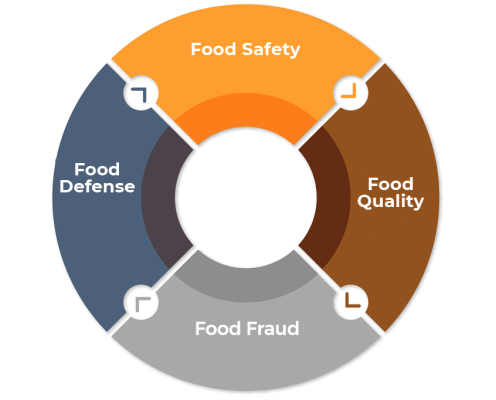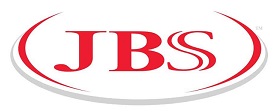How We Operate In Quality And Innovation
JBS is reasserting its business strategy based on innovation, quality, customer service and relationships. The management model of the area for Responsibility to Consumers is coordinated by the Quality, R&D and Innovation departments of the respective businesses who define the guidelines, indicators and priorities for investment in research, food safety and quality.
To achieve this objective in the 15 countries where the company operates, abiding by local regulatory requirements and global standards of quality, the company relies on the Global Food Safety and Quality Assurance Department headquartered in the United States.
Each Business Unit has a team specialized in Food Quality and Safety, responsible for implementing the area’s policies and guidelines locally, considering the operation in four fronts: Food Safety, Food Quality, Food Fraud, and Food Defense. The area leaders supervise all Food Safety and Quality Assurance Programs from each Unit, working in collaboration with the Global Department.
The company also relies on the Global Department for Excellence and Innovation and the Global Innovation Team (GIT), which came into existence in 2018 to encourage teams to exchange experiences. So, in addition to leveraging the competitive advantages of JBS, the GIT fosters the sharing of experiences among the business units on the five continents where the company is present, which promotes the sharing of innovative practices.
The Company also runs the JBS Global Center for Innovation in Food, a partnership with the Colorado State University (CSU). The Center is a teaching and research unit dedicated to enhancing food safety, beef sciences, animal welfare, and the development education and training actions, as well as equipment testing.

Supply Chain Protocol

In early 2018, Friboi launched the Supply Chain Protocol as a way to certify that criteria that ensure food safety and the strictest requirements from clients and consumers are met. The certificate includes strict protocols in topics such as animal welfare, traceability, sustainability, operation, production, quality, processing and marketing.
The standards used for establishing the Protocol’s parameters are acknowledged worldwide, such as the British Retail Consortium (BRC), Regulation 1099 from the European Union on Animal Welfare, the US AMI Protocol on Animal Welfare, and the European Union Traceability Regulation.
To ensure the units are certified, they go through a five-step process, including gap analysis conducted by an external consulting firm and specific training sessions. Currently, all Friboi units in Brazil operate following the Protocol standards and go through an external audit every year, conducted by the Brazilian Certification Service (SBC).
Technology and Processes
Through continuous investments in research and cutting-edge technologies, the Company’s innovative culture is present in the development of new products, in the monitoring of raw materials and in manufacturing operations.
The Company maintains laboratories specialized in microbiological and biotechnology analyses in its units around the world, providing food safety indicators to its different brands and ensuring product quality. By modernizing the infrastructure and equipment used, JBS manages to have increasingly precise results and smaller analysis times.
Another focus from JBS is the constant Team qualification, to ensure that the Team Members follow the best Food Safety and Quality practices in all Company processes.

JBS, in partnership with the Colorado State University (CSU), has built the JBS Global Food Innovation Center, an education and research unit that allows the Company to further advance in enhancing food safety, meat sciences, and animal welfare practices. The Center also carries out education and training actions, as well as develops equipment tests.

Labeling
JBS products around the world need to meet different labeling requirements, in compliance with local legislations and according to good market practices.
In labels, information such as food composition, nutritional tables, net weight, best by dates and other manufacturing details help consumers assess the quality of the product presented.
In the Brazilian operation, the products must have the seal from the Ministry of Agriculture’s Federal Inspection Service (SIF), and also meet demands from the National Sanitary Inspection Agency (Anvisa), such as detailing eventual allergens contained in foods.
In the United States, the seal is granted by the United States Department of Agriculture, Food Safety and Inspection Service (USDA, FSIS). The information included in the label varies according to the product and place, but range from method of preparation to details of composition, dietary supplements like vitamins, minerals and fibers, and statement of presence of allergens.
Innovation
JBS constantly strives for market differentiation, with innovative products that meet expectations from clients and consumers. To deal with the need of always being aware to new demands, the Research & Development (R&D) areas from the food Business Units work in two sectors, fresh and prepared foods, since each of them must cater to specific channels, with their own demands and different needs.
To optimize the efforts for developing products with higher demand among customers, the Company has management tools that help assessing mega global food trends, such as reduction in fat and sodium contents, presentation in smaller portions, among others. .
Another line of work adopted by JBS is the creation of a methodology to track regional innovation processes and enable for lessons learned to become available globally, especially in prepared food lines and in brand value creation. This is a project developed by the Global Innovation Team (GIT) since October 2018, with the goal of increasing information sharing, accelerating innovation with exchange between countries, and creating global platforms that favour innovative practices.

